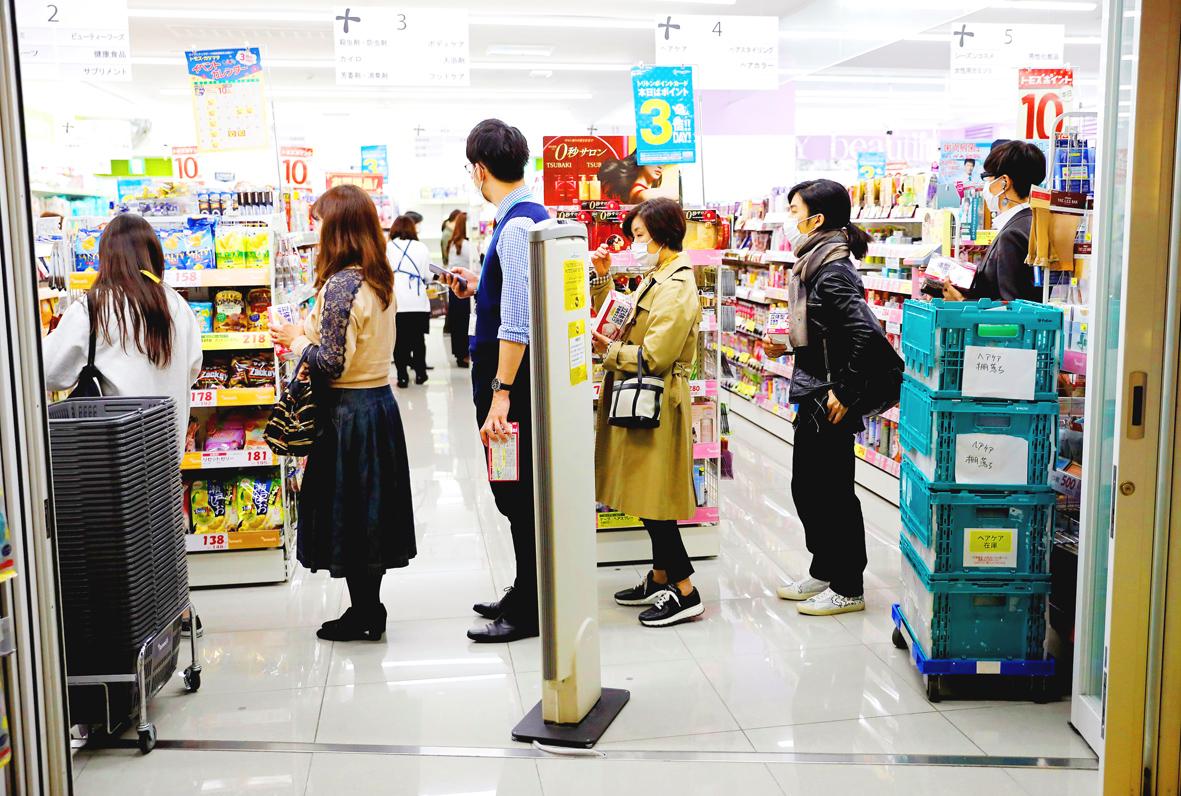Japan is to set up a COVID-19 task force, the government said yesterday, as it warned of a high risk of a wide spread of the virus, but the economy minister said the government was not immediately thinking of declaring a state of emergency.
Japan had reported 1,313 domestic cases of COVID-19 as of yesterday morning, separate from 712 cases on a cruise ship that was moored near Tokyo last month, broadcaster NHK reported.
There have been 45 domestic deaths and 10 from the cruise ship.

Photo: Reuters
“I told [Japanese] Prime Minister [Shinzo] Abe there is a high risk of coronavirus spreading widely,” Japanese Minister of Health, Labor and Welfare Katsunobu Kato told reporters after a meeting Abe and Japanese Minister of Economy, Trade and Industry Yasutoshi Nishimura.
Nishimura said that Abe told him to “proceed swiftly with setting up the government task force” based on Kato’s report, but that the government was not immediately considering declaring a state of emergency.
Under a law amended this month to cover the coronavirus pandemic, the prime minister can declare a state of emergency if the disease poses a “grave danger” to lives and if its rapid spread threatens serious economic damage.
A state of emergency would allow governors in hard-hit regions to take steps such as asking people to stay at home, closing schools and other public facilities, and canceling large events.
Japanese shares tumbled yesterday following three days of big gains after the rise in domestic cases stoked worries of tougher domestic restrictions to implement social distancing.
Hitachi Ltd instructed 50,000 employees at its group companies in Tokyo to work from home and avoid unnecessary outings.
The decision to set up the task force — a necessary step to declaring an emergency — followed a sharp jump in cases in Tokyo, making the capital the epicenter of Japan’s outbreak.
Tokyo Governor Yuriko Koike on Wednesday warned of the risk of an explosive rise in infections in the capital and asked residents to avoid non-essential outings through April 12, especially over the weekend.
“The government and local authorities will cooperate based on the awareness that this is a very critical time to prevent the spread of the virus,” Japanese Chief Cabinet Secretary Yosihide Suga told a news conference.
Koike asked the neighboring prefectures of Saitama, Chiba and Kanagawa to ask their residents to refrain from non-urgent, non-essential travel to Tokyo, the Nikkei reported.
Abe has already told schools to close — although many are now preparing to reopen — and asked organizers to refrain from large events, but his instructions had no formal legal basis.
Even if a state of emergency is declared, legal experts have noted there are no penalties for ignoring most instructions, but the declaration would put added pressure on people and businesses to obey.

Kehinde Sanni spends his days smoothing out dents and repainting scratched bumpers in a modest autobody shop in Lagos. He has never left Nigeria, yet he speaks glowingly of Burkina Faso military leader Ibrahim Traore. “Nigeria needs someone like Ibrahim Traore of Burkina Faso. He is doing well for his country,” Sanni said. His admiration is shaped by a steady stream of viral videos, memes and social media posts — many misleading or outright false — portraying Traore as a fearless reformer who defied Western powers and reclaimed his country’s dignity. The Burkinabe strongman swept into power following a coup in September 2022

‘FRAGMENTING’: British politics have for a long time been dominated by the Labor Party and the Tories, but polls suggest that Reform now poses a significant challenge Hard-right upstarts Reform UK snatched a parliamentary seat from British Prime Minister Keir Starmer’s Labor Party yesterday in local elections that dealt a blow to the UK’s two establishment parties. Reform, led by anti-immigrant firebrand Nigel Farage, won the by-election in Runcorn and Helsby in northwest England by just six votes, as it picked up gains in other localities, including one mayoralty. The group’s strong showing continues momentum it built up at last year’s general election and appears to confirm a trend that the UK is entering an era of multi-party politics. “For the movement, for the party it’s a very, very big

ENTERTAINMENT: Rio officials have a history of organizing massive concerts on Copacabana Beach, with Madonna’s show drawing about 1.6 million fans last year Lady Gaga on Saturday night gave a free concert in front of 2 million fans who poured onto Copacabana Beach in Rio de Janeiro for the biggest show of her career. “Tonight, we’re making history... Thank you for making history with me,” Lady Gaga told a screaming crowd. The Mother Monster, as she is known, started the show at about 10:10pm local time with her 2011 song Bloody Mary. Cries of joy rose from the tightly packed fans who sang and danced shoulder-to-shoulder on the vast stretch of sand. Concert organizers said 2.1 million people attended the show. Lady Gaga

SUPPORT: The Australian prime minister promised to back Kyiv against Russia’s invasion, saying: ‘That’s my government’s position. It was yesterday. It still is’ Left-leaning Australian Prime Minister Anthony Albanese yesterday basked in his landslide election win, promising a “disciplined, orderly” government to confront cost-of-living pain and tariff turmoil. People clapped as the 62-year-old and his fiancee, Jodie Haydon, who visited his old inner Sydney haunt, Cafe Italia, surrounded by a crowd of jostling photographers and journalists. Albanese’s Labor Party is on course to win at least 83 seats in the 150-member parliament, partial results showed. Opposition leader Peter Dutton’s conservative Liberal-National coalition had just 38 seats, and other parties 12. Another 17 seats were still in doubt. “We will be a disciplined, orderly